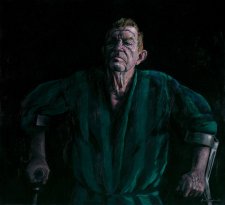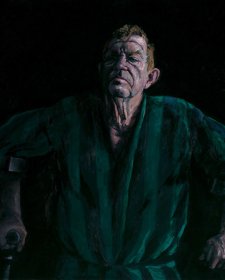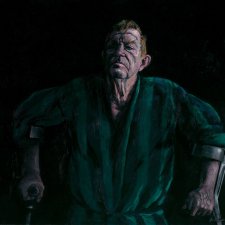- About us
- Support the Gallery
- Venue hire
- Publications
- Research library
- Organisation chart
- Employment
- Contact us
- Make a booking
- Onsite programs
- Online programs
- School visit information
- Learning resources
- Little Darlings
- Professional learning
Robert Hughes AO (1938–2012), historian and critic, was one of one of a number of ambitious young intellectuals who left Australia in the late sixties and forged substantial careers abroad. Born in Sydney and educated at Riverview and Sydney University, he began his career like many of the figures who floated around the Sydney ‘Push’ in the late 1950s, contributing poems, cartoons, criticism and articles to Honi Soit, the Observer and Nation. He began working for Time magazine in 1970, the year his The Art of Australia was published, and henceforth lived in the USA; he was the senior art critic for Time until 2001 and continued to contribute review articles to that publication for some years. His books include The Shock of the New (1980, also a television series), The Fatal Shore (1987), Nothing if Not Critical (1990), Barcelona (1992), American Visions (1997, also a television series) and A Jerk on One End (1999), the title of which refers to his love of fishing. In 1999, just after beginning to film his television series on Australia Beyond the Fatal Shore, Hughes suffered a terrible car accident on the coast of WA. The series was cobbled together during his agonising convalescence, and Hughes had little control over the final cut, but its negative reception led to his remark that for all he cared, they could ‘tow Australia out to sea and sink it’. Named the London Sunday Times Writer of the Year in 2000, he proceeded to write Goya (2003) and a superb autobiography, Things I Didn’t Know (2006).
Rex Dupain (b. 1954) is the son iconic Australian photographer Max Dupain. Trained as a painter, Rex turned his focus to photography in the mid 1990s.
Collection: National Portrait Gallery
Purchased 1999
© Rex Dupain and the Estate of Max Dupain



On one level The Companion talks about the most famous and frontline Australians, but on another it tells us about ourselves.



Magda Keaney talks with Bill Leak about his bold new portrait of Robert Hughes in the National Portrait Gallery collection.



Visit us, learn with us, support us or work with us! Here’s a range of information about planning your visit, our history and more!